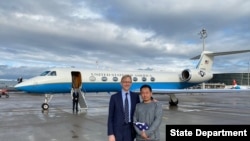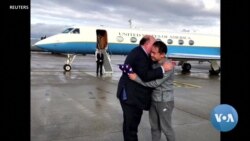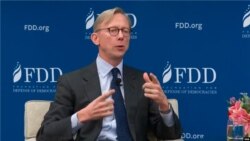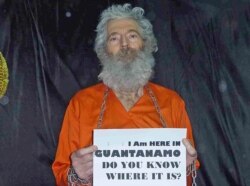The United States has taken a more positive stance on Iranian offers of prisoner swaps since the two sides carried out a rare detainee exchange in Zurich through Swiss mediation on Saturday.
Iranian Foreign Minister Mohammad Javad Zarif has been among several officials to express a readiness for more prisoner swaps with Washington following Saturday's exchange, which involved Iran freeing Chinese American academic Xiyue Wang in return for the U.S. releasing Iranian scientist Masoud Soleimani.
In a Monday tweet, Zarif said, “After getting our hostage back this week, fully ready for comprehensive prisoner exchange. The ball is in the US' court.”
In a Wednesday briefing to reporters at the State Department, Secretary of State Mike Pompeo said he hoped the Saturday prisoner exchange "portends well" for bringing back more Americans detained in Iran.
"We've had some indication that that may be the case, but I don't want to overstate that. I don't want to give false optimism about that pathway," Pompeo said.
A Tuesday report by Iranian state news agency IRNA cited a Zarif aide as expressing a desire to continue working on prisoner swaps with the United States but also saying there had not yet been a directive to do so. The aide, Mohsen Baharvand, said he sat at a table with U.S. Special Representative for Iran Brian Hook during Saturday's prisoner exchange at a Zurich airport hangar while declining what he said was Hook's request for a conversation.
Speaking later Tuesday at a Foundation for Defense of Democracies forum in Washington, Hook confirmed that he sat at the table with Baharvand and welcomed the reported comments by the Iranian foreign ministry official responsible for American affairs.
“Those were positive comments. And let's see if we can build on it,” Hook said. In reference to the completed prisoner swap, he said: “I am hopeful that this is a first step and … can lead to the release of all innocent Americans who are currently detained in Iran. It does show that there is a way for the United States and Iran to reach an agreement.”
In a separate interview with U.S. network NPR, Hook said his team was “ready” to work on the next prisoner exchange. “I am going to ask for a consular dialogue with the Iranians so that we can get the remaining Americans out,” he said.
Washington and Tehran have used Switzerland as a mediator for such consular dialogue, as the two sides have had no diplomatic relations since Iran’s 1979 Islamic Revolution that brought to power Islamist clerics hostile toward America. The two nations had not carried out a prisoner swap since a 2016 exchange under President Donald Trump’s predecessor Barack Obama.
Speaking to VOA at the State Department on Wednesday, Hook said he is open to speaking directly with Iranian diplomats about more prisoner swaps. But, he said those diplomats appear to have no mandate to reciprocate.
“I think there are a lot of people in Iran’s foreign ministry who would like to talk to the United States and come to the table. But their Supreme Leader [Ayatollah Ali Khamenei] doesn’t give them much of a leash. And I think that became clear in Zurich,” Hook said.
Hook also told VOA the “proper way” for the U.S. and Iran to handle discussion of further prisoner swaps is through “quiet diplomacy” rather than in public, which he said is not helpful.
Hook’s positive attitude toward the latest Iranian offers contrasted with a more skeptical and critical tone adopted by the Trump administration over the past year. As recently as Saturday, a senior U.S. official told reporters the administration “never believed” that public comments by Zarif in favor of prisoner swaps “were very serious.”
Baharvand told IRNA Tehran is seeking the release of around 20 Iranians held by the United States, which has detained a number of Iranians for violating its sanctions against Iran in recent years.
Washington has been seeking the release of several Americans whom Iran has acknowledged jailing for national security offenses that U.S. officials have dismissed as fabricated. They include Navy veteran Michael R. White and three Iranian-American dual nationals — father and son Siamak and Baquer Namazi and Morad Tahbaz.
U.S. officials also have been pressing Iran to resolve the case of Robert Levinson, a retired FBI agent who went missing in Iran on a 2007 visit that U.S. media later revealed was part of a rogue CIA mission. Levinson’s family has said it believes Iran has been detaining him secretly since his disappearance and has sued the nation in a U.S. court for $1.5 billion in damages.
Iranian officials repeatedly have denied knowledge of Levinson’s whereabouts in public statements.
In an interview with an NBC affiliate network on a Saturday visit to Florida, President Trump said his administration was working “very hard” on Levinson’s case. “We're getting certain signals that he may be alive,” Trump said.
Levinson’s wife and seven children have said there have been no signs of life from him since his captors sent a video and photos of him looking gaunt and disheveled in 2010 and 2011 respectively.
“President Trump’s remarks were very significant, especially about our husband and father being alive. It was so positive, and we welcome it,” the Levinson family said in an email to VOA Persian. “It’s clear that the president and his team have a personal commitment to helping hostages, including Bob Levinson. That commitment and the momentum around the case are unlike what we have seen before, and it means so much to our family.”
Former U.S. ambassador to the U.N. Bill Richardson, who has secured multiple releases of Americans detained by authoritarian governments, told VOA Persian that he has been pressing Iranian officials for information about Levinson, particularly after Tehran notified the world body last month that there was an “open case” about Levinson in Iran’s Revolutionary Court system.
Iranian officials later downplayed that notification, calling it a routine move for a “missing person” case. “I don't quite accept that. I think there is more to it. And we're going to keep digging,” Richardson said. “The problem is that the information is held very tightly by Iran’s Islamic Revolutionary Guard Corps. So it’s hard to get information from other sources in the Iranian government, like the foreign ministry.”
Richardson said he has discussed the Levinson case with Iranian officials attending U.N. meetings in New York, where he spoke with Zarif in September. The former U.S. diplomat also had been communicating with those officials and the Trump administration for more than a year to try to coordinate the release of Xiyue Wang.
“Now that we’ve established a bit of trust on the prisoner issue, hopefully the Iranians soon will shed some light on Levinson,” Richardson said. “But I think it's critically important that the U.S. government make this a major priority.”
This article originated in VOA’s Persian Service. Nike Ching contributed from the State Department and Patsy Widakuswara contributed from the White House.








